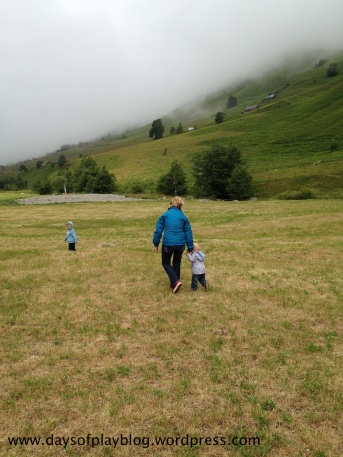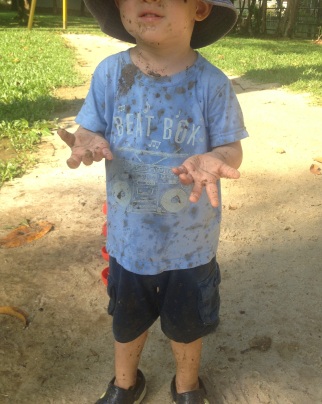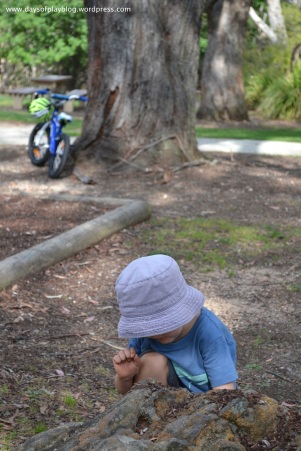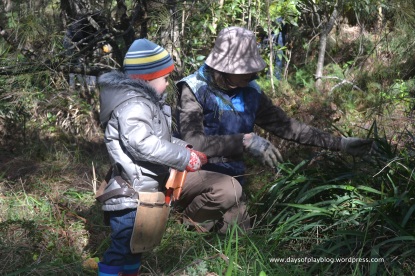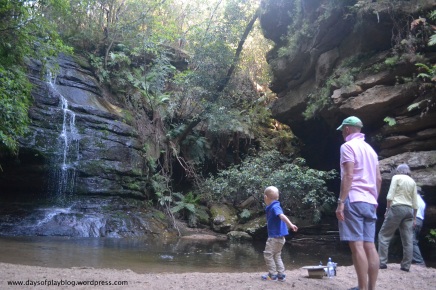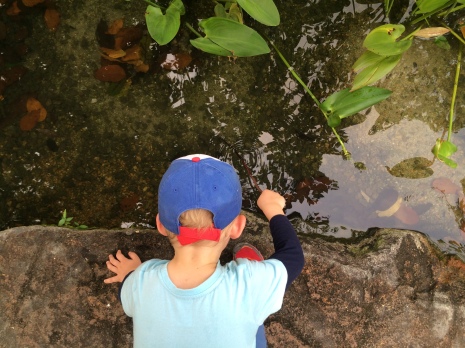It had been a horrendous day. I can’t remember the specifics, but I know that I was wired, bristling with anger and frustration. That I had safely driven myself home from work was a miracle. My entire body seemed to be shaking with stress, ready to collapse under the weight of my own expectations.
I got out of the car and dumped down my bags and keys. My breathing was shallow, my shoulder muscles were about to snap. The patch of grass and shrub-lined sanctuary of our front garden seemed to draw me to it. I kicked off my shoes and rushed to put my bare feet on the grass. I stood up straight and pressed my feet into the ground as hard as I could, as if I wanted to somehow root myself down in the clay-packed grass.
I breathed deeply and looked up, my lungs somehow expanding as my eyelids stopped flickering with anxiety. I breathed out, and the garden seemed to breath out with me. A collective sigh that comforted and calmed me, letting me know that I was not alone, that there were forces in the world stronger than me and my need to be perfect in my job. The trees surrounding me, the grass & earth under my feet, they all met my convulsing nervous system and brought it back from the brink.
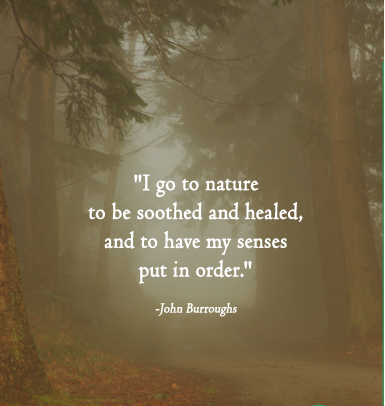
Nature-Deficit Disorder
While I might sound like a total bean-munching, hemp-wearing, daisy-chain-making hippy, I’m not the only one who believes that nature has an influence on our physical and emotional health. Richard Louv, journalist and author of “Last Child in the Woods: Saving Our Children From Nature-Deficit Disorder” (2005), describes a growing body of research that links our mental, physical, and spiritual health directly to our association with nature. Louv calls our disconnected relationship with the outdoors a “nature-deficit disorder”, and outlines how this impacts on our children especially. Studies point to exposure to nature as a way to reduce symptoms of ADHD, and suggest that it can “improve all children’s cognitive abilities and resistance to negative stresses and depression.”
Suffering senses
As a teacher and parent here in the concrete jungle of Singapore, I see first-hand how children’s sensory development is impacted by a lack of contact with nature. I encountered students showing signs of anxiety (hair loss, tantrums, nervous habits) and those whose life as a learner was already suffering from a lack of sensory development (ability to focus, to have the strength in their core needed to control their body, kids who had skipped developmental stages through highly academic preschooling). While the issue is a complex one, I truly believe that so much of this was caused by a lack of contact with nature. We need nature for the healthy development of our human senses.
Many of our students here in Singapore don’t have their feet touch grass at any time throughout their day. Instead, they travel from their tiled high-rise apartment, to their air-conditioned school bus, to their concrete-floored school, to their astro-turfed sporting field, home to their rubber-mat playground, perhaps to the shopping mall for dinner. And that’s before we even begin to talk about how their little nervous systems are bombarded with electronic messages, overscheduling and a lack of opportunities to engage in self-directed play. While this may sound extreme, it is a common reality here in Singapore that to make nature a part of your day needs to be a conscious choice. Our opportunities to interact with a natural environment must be sort out and prioritised if they are to happen at all.
So, how can a lack of contact with nature impact on our children?
Balance & Core strength
Walking over uneven surfaces, having the bare soles of your feet touch varied textures when walking, can impact a child’s sense of balance and ultimately core strength. Think of all the nerve endings in your feet, and how many tiny twitch muscles are used to walk over sand. Being able to sit still, master your fine motor skills, focus your head, and control your body within a space are all important developments that stem from your balance and core strength. Your ability to focus and track your eyes across a page has also been linked to your core muscles. That’s why I think it is more important to go climb a tree for kids than do phonics flash cards when it comes to learning to read. So many of our children lack the core strength needed to control their bodies in a classroom. Even if they wanted to focus…
Focus & concentration
Environmental psychologists, Stephen and Rachel Kaplan, have studied people participating in wilderness programs, and found persuasive evidence when it comes to how nature can impact on our ability to pay attention. They describe two kinds of attention: directed attention and fascination, or involuntary attention. One requires effort and the avoidance of distractions, and the other is inherently effortless. Think of trying to put the words together in a difficult email, or trying to understand the steps of a recipe, versus watching a squirrel climbing up a tree and along its branches. The Kaplans found that too much directed attention led to “directed-attention fatigue” in their subjects, while spending time in nature, a perfect environment for effortless attention, can help to relieve people of this directed-attention fatigue. Their research points to nature as being the restorative relief we need when directed-attention fatigue leads to irritation, agitation and inability to concentrate. Spending more time in a state of effortless attention strengthens our ability to focus with our directed attention when we really need it. Need more convincing on how nature can help your child’s ability to concentrate? Nancy Wells, assistant professor at the New York State College of Human Ecology studied children’s cognitive functioning when they moved to houses adjacent to natural, green spaces. Her study found that being close to nature can generally help to boost a child’s attention span.
So many of our children may suffer from directed-attention fatigue. From teacher direction at school all day, to tutor-directed enrichment classes in the evening, to coach-directed sporting drills on the weekend.
Calm kids
When my son was younger, we used sandpit-play as a tonic. “Get that boy into some sand!” we would say on those days where he was especially whiney and agitated. And it always worked – shoes off, hands busy pouring and digging and patting. It seemed to calm his senses, and we noticed when it had been too long between visits to the sandpit.
We do much the same now, although nowadays the sandpit has been swapped for jungle walks at MacRitchie, tree climbing or helping with the gardening in our own home. Everybody (myself included!) is calmer and better able to deal with life after time in nature. Nancy Wells and Gary Evans researched the impact of life stress among children among children with high levels of nearby nature and among those with little nearby nature. Their results suggested that the presence of nearby nature lessens or buffers the impact of life stress on children. “The psychological effects of stressful life events such as family relocation, being picked on or punished at school, or being subject to peer pressure varied depending on the amount of nearby nature to which the children, aged 6 through 12, had access.” Read their entire report here.
This is one of the reasons why we have spent so much time and money on greening our home here in Singapore, and why we will always choose the park over an indoor play centre.
Future shades of green
I’ve always considered myself a bit of a greenie. I’ve written letters to local government to petition against rampant development, I recycle and compost, I refuse plastic bags (which can be a combative sport in plastic-fantastic Singapore). I was blessed with plenty of nature play right throughout my childhood, and I believe that has given me a solid foundation from which to appreciate the intricate, inherently beautiful systems that exist in our natural world. I’m doing all I currently can to help keep our planet Earth in balance. How do we expect our children to do the same, if they haven’t spent close time with nature in their early years? If they haven’t truly understood the ecosystems that exist right outside their door, how can they possibly be expected to tackle the problems of imbalance that our world will surely face in the future?
I try to allow myself to be slowed down with and by my son, to greet the new yellow dragonfly who has come to land in our garden at breakfast each morning. To notice whether the grass along the road is brown today, or green. To marvel at our first papaya flower and its development. To wait patiently as he collects as many seed pods as his hands and my hat can hold. Because without an appreciation of these small, everyday things, how will he ever realise just how much of an important role nature has to play in his life?
See my play report on Jurong Eco Garden.

